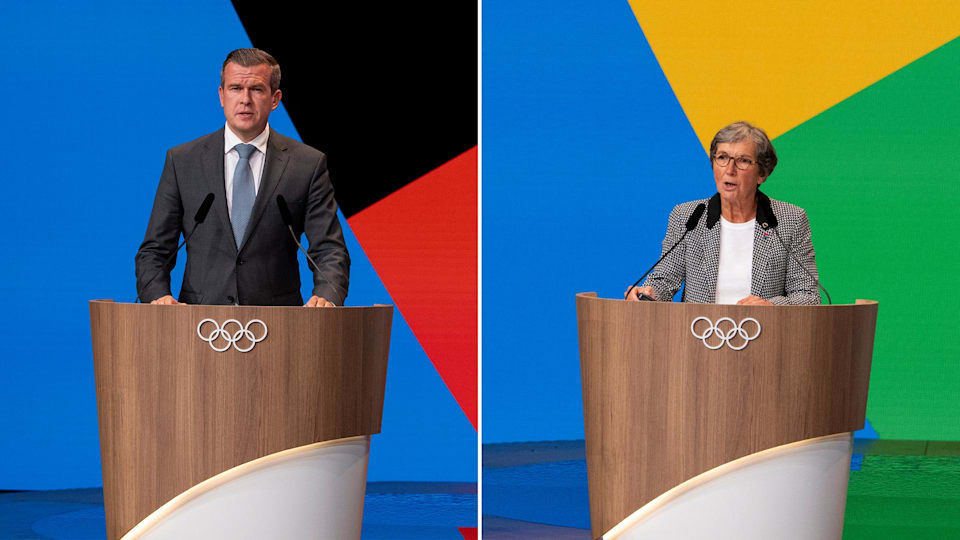142nd IOC Session receives updates on worldwide anti-doping activities and preparations for Paris 2024
In reports from both the International Testing Agency (ITA) and the World Anti-Doping Agency (WADA) at the 142nd IOC Session, IOC Members heard about the rigorous pre-Games testing programme that is being implemented for the Olympic Games Paris 2024, together with the strategic plans for future anti-doping activities.

ITA: Close to 90 per cent of athletes tested ahead of Olympics
ITA Foundation Board Chair Dr Valérie Fourneyron began her address by reporting on the comprehensive pre-Games testing programme for the Olympic Games Paris 2024, with 88 per cent of participating athletes being tested at least once before the Games. As of 17 July, (cutoff date for the preliminary report) , over 32,000 doping controls had been carried out, corresponding to around 45 per cent more testing than in the previous six months on the same athlete population. Special focus had been put on high-risk disciplines, in which 75 per cent of participating athletes had been tested three times or more, and 95 per cent at least once. These results surpassed those for Tokyo 2020, making the Paris 2024 pre-Games testing programme the most comprehensive ever to be implemented.
The ITA’s “pre-Games” programme began a year ago, to support testing efforts across the world, so that all athletes, disciplines and countries present at the Olympic Games were subject to a proportionate and fair testing regime, in the sensitive phase of qualification. This included strategic recommendations to the National Anti-Doping Organisations (NADOs) and the Summer Olympic International Federations (IFs) to test athletes who had qualified or were likely to qualify.
The ITA programme included specific follow-up for:
- the delegation of refugee athletes, with an appropriate education and testing programme;
- Individual Neutral Athletes (AINs), with targeted and independent anti-doping tests over several months; and
- the delegation of Chinese swimmers, with independent controls carried out throughout the year, and more intensively in recent months.
Dr Fourneyron then detailed the ITA’s Games-time clean sport programme for Paris 2024, which includes out-of-competition tests across France and abroad, together with in-competition tests at all sports venues, with around 6,000 samples collected and analysed during these Games. The risk assessment, on which the large-scale anti-doping programme is based, combined a broad set of data and factors, including testing gaps observed across sports and countries.
The ITA will now adapt its testing strategy during the Games as necessary, including based on the outcomes of the pre-Games programme to continue to avoid any testing gaps. Any positive cases that arise during the Games will be managed independently by the ITA and, if need be, referred promptly to the Court of Arbitration for Sport, on the IOC’s behalf.
Dr Fourneyron concluded: “This programme reaffirms the ITA’s determination to constantly improve the expertise and independence of anti-doping programmes. We need to always be alert, analyse more and more data, and never let our guard down. This is key to fostering trust and credibility, in particular among the athlete community.”
WADA welcomes Independent Prosecutor’s interim report on the swimmers’ case
Addressing the IOC Members, WADA President Witold Bańka endorsed the anti-doping efforts of the ITA, the International Federations and National and Regional Anti-Doping Organisations, and confirmed that the WADA-accredited laboratory in Paris is ready for the challenge that awaits.
Bańka also addressed the issue of the Chinese Anti-Doping Agency’s no-fault contamination case involving 23 swimmers, and the WADA-appointed Independent Prosecutor Eric Cottier’s interim report.
“We did so because of serious allegations that were being levelled against us,” he said, referring to the decision to appoint the Independent Prosecutor. “As you may have seen, on 9 July, the Independent Prosecutor delivered his interim report. His conclusions could not be any clearer: that WADA did not show any bias, undue interference or other impropriety in its assessment of the Chinese Anti-Doping Agency’s decision not to bring forward anti-doping rule violations; and that WADA’s decision not to appeal the cases in the Court of Arbitration for Sport was indisputably reasonable, based on the evidence.”
With regard to the US Anti-Doping Agency (USADA)’s allegations, the WADA President said the organisation would continue to work with all constructive partners in the United States to address the situation, including the US Government, and the US Olympic and Paralympic Committee (USOPC).
He added: “The global anti-doping system becomes increasingly robust every year, which is due to the strong collaborations that we have with key stakeholders, such as the IOC and the whole sports movement. The teamwork involved in preparing for the Paris Games is proof of this.”